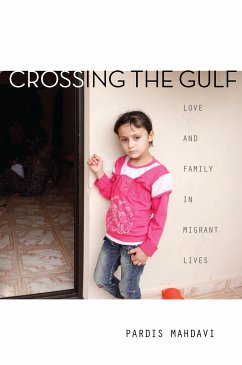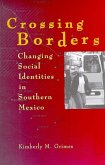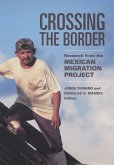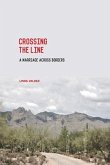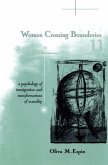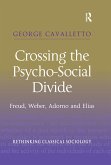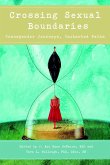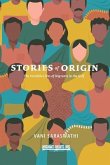- Broschiertes Buch
- Merkliste
- Auf die Merkliste
- Bewerten Bewerten
- Teilen
- Produkt teilen
- Produkterinnerung
- Produkterinnerung
This book considers the intimate lives of migrant laborers and highlights the shortcomings of policies that criminalize migrants and their loved ones.
Andere Kunden interessierten sich auch für
![Crossing Borders Crossing Borders]() Kimberly M GrimesCrossing Borders33,99 €
Kimberly M GrimesCrossing Borders33,99 €![Crossing the Border Crossing the Border]() Crossing the Border38,99 €
Crossing the Border38,99 €![Crossing the Line Crossing the Line]() Linda ValdezCrossing the Line21,99 €
Linda ValdezCrossing the Line21,99 €![Women Crossing Boundaries Women Crossing Boundaries]() Oliva EspinWomen Crossing Boundaries83,99 €
Oliva EspinWomen Crossing Boundaries83,99 €![Crossing the Psycho-Social Divide Crossing the Psycho-Social Divide]() George CavallettoCrossing the Psycho-Social Divide67,99 €
George CavallettoCrossing the Psycho-Social Divide67,99 €![Crossing Sexual Boundaries Crossing Sexual Boundaries]() Crossing Sexual Boundaries26,99 €
Crossing Sexual Boundaries26,99 €![Stories of Origin: The Invisible Lives of Migrant in the Gulf Stories of Origin: The Invisible Lives of Migrant in the Gulf]() Vani SaraswathiStories of Origin: The Invisible Lives of Migrant in the Gulf12,99 €
Vani SaraswathiStories of Origin: The Invisible Lives of Migrant in the Gulf12,99 €-
-
-
This book considers the intimate lives of migrant laborers and highlights the shortcomings of policies that criminalize migrants and their loved ones.
Hinweis: Dieser Artikel kann nur an eine deutsche Lieferadresse ausgeliefert werden.
Hinweis: Dieser Artikel kann nur an eine deutsche Lieferadresse ausgeliefert werden.
Produktdetails
- Produktdetails
- Verlag: Stanford University Press
- Seitenzahl: 216
- Erscheinungstermin: 27. April 2016
- Englisch
- Abmessung: 226mm x 152mm x 23mm
- Gewicht: 318g
- ISBN-13: 9780804798839
- ISBN-10: 0804798834
- Artikelnr.: 44383344
- Herstellerkennzeichnung
- Libri GmbH
- Europaallee 1
- 36244 Bad Hersfeld
- gpsr@libri.de
- Verlag: Stanford University Press
- Seitenzahl: 216
- Erscheinungstermin: 27. April 2016
- Englisch
- Abmessung: 226mm x 152mm x 23mm
- Gewicht: 318g
- ISBN-13: 9780804798839
- ISBN-10: 0804798834
- Artikelnr.: 44383344
- Herstellerkennzeichnung
- Libri GmbH
- Europaallee 1
- 36244 Bad Hersfeld
- gpsr@libri.de
Pardis Mahdavi is Associate Professor and Chair of Anthropology at Pomona College. She is the author of Passionate Uprisings: Iran's Sexual Revolution (Stanford, 2008) and Gridlock: Labor, Migration, and Human Trafficking in Dubai (Stanford, 2011). She has been a Woodrow Wilson Center Fellow and a Google Ideas Fellow.
Contents and Abstracts
1Im/mobilities and Im/Migrations
chapter abstract
The opening chapter provides the theoretical framework of the book. It
introduces the concept of "intimate im/mobilities" and explores the
alternative frameworks of im/mobility and im/migration. This chapter
presents the book's three main interconnected arguments. First, that
migration is impacted by individuals' intimate lives and vice versa.
Second, through narrating the intimate lives of laborers, the book explores
the mutually constitutive forces of mobility and immobility. Finally, in
looking at the mutually re-enforcing notions of im/mobility, the book
explores the liminal space between immigration and migration. This chapter
lays out these main arguments/framings to introduce the core themes that
will be fleshed out through the individual chapters. It also provides a
brief methodological and historical background to help set the stage for
the ethnographic chapters to follow.
2Love, Labor and the Law
chapter abstract
This chapter looks at the confluence of love, labor and the law by focusing
on the regulation of migrant women's sexualities while they are in the
Gulf. Migrant women increasingly comprise the majority of migrants to the
region as the demand for intimate labor in the Gulf is on the rise. But
migrant women who become pregnant while in the Gulf are immediately
imprisoned and charged with the crime of zina, thereby immobilizing them
and halting their family lives. These women give birth while incarcerated
and spend up to a year with their babies in prison. Many are then forcibly
separated from their children when they are deported, rendering the
children stateless in the host country. Some migrant women have recently
been protesting these laws by refusing and fighting deportation without
their children. This chapter contrasts discourse and legal analysis with
the lived experiences of migrant women and their children.
3Inflexible Citizenship and Flexible Practices
chapter abstract
Chapter 3 focuses on the effects of migration on the intimate lives of
migrants and their kin. It looks at the children of migrants, many of whom
have either migrated to work or re-unify with parents abroad, while others
were born in the host country. These families are struggling to define and
re-define their understandings of family, citizenship, and belonging across
borders. Building on the work of several migration scholars, the author
examines how intimate lives are shaped by migration in the particular
context of the UAE and Kuwait. The chapter explores the challenges migrants
and their kin face in the form of inflexible citizenship, as well as the
flexibility they employ to create types of mobility within the context of
apparent immobility.
4Changing Home/s
chapter abstract
The migrants whose stories are introduced in this chapter chose to migrate
in search of a type of intimate mobility that they could not find at home.
They also migrate in search of economic prosperity and upward class
mobility; however, social reasons are at the top of their migratory
decision-making factors. Specifically, these young women and men describe
wanting to migrate not out of poverty, and not out of a desire to support
their families, but out of their families and communities altogether. This
aspect of migration is an example of intimate mobilities that puts into
play the relationship between mobility and immobility in the intimate lives
of im/migrants whose migratory journeys take them in search of a new
"home." Attention to the complex decision making processes helps to
describe the role of migration in encouraging the exploration of
subjectivity for many individuals.
5Children of the Emir:
chapter abstract
Chapter 5 introduces the many children of migrant women and men who have
been separated from their parents. Some of these children have been born in
host countries to trafficked women and have become stateless. Others are
children who were born to migrant women and spend their lives as
non-citizens in the host countries. Still others are children who are
separated from their parents when their parents migrate, while the children
stay home and are raised by other relatives. The experiences of these
children as they encounter the state reveal the biopolitical undertones of
laws and regulations implemented to govern their lives. Two interconnected
theoretical lenses prove useful: theories about perverse integration and
theories about legal productions of illegality, which, together lead to a
concept of "perverse intimacies."
6Transformations and Mobilizations
chapter abstract
Chapter 6 draws on ethnographic fieldwork with migrants and state officials
charting changes in state policies that have come from migrant-state
encounters. The chapter is focused on stories of migrant activism both at
home and abroad, and details the ways in which they have drawn from their
own intimate lives to make changes in state and global policies. Various
intimate interactions between migrants and personifications of the state
are highlighted to complicate the perceived oppositional binary of migrants
vs. the state.
7Negotiated Intimacies and Unwanted Gifts
chapter abstract
This concluding chapter emphasizes the creative ways that migrants and
their families have navigated the many challenges they face, often drawing
from their own intimate lives. The chapter focuses on the transformative
effects of migrants on the state to argue against trafficking as a
framework, discourse, and set of policies. Trafficking as a framework is
deconstructed and, instead, a framing of "safe migration" is proposed.
1Im/mobilities and Im/Migrations
chapter abstract
The opening chapter provides the theoretical framework of the book. It
introduces the concept of "intimate im/mobilities" and explores the
alternative frameworks of im/mobility and im/migration. This chapter
presents the book's three main interconnected arguments. First, that
migration is impacted by individuals' intimate lives and vice versa.
Second, through narrating the intimate lives of laborers, the book explores
the mutually constitutive forces of mobility and immobility. Finally, in
looking at the mutually re-enforcing notions of im/mobility, the book
explores the liminal space between immigration and migration. This chapter
lays out these main arguments/framings to introduce the core themes that
will be fleshed out through the individual chapters. It also provides a
brief methodological and historical background to help set the stage for
the ethnographic chapters to follow.
2Love, Labor and the Law
chapter abstract
This chapter looks at the confluence of love, labor and the law by focusing
on the regulation of migrant women's sexualities while they are in the
Gulf. Migrant women increasingly comprise the majority of migrants to the
region as the demand for intimate labor in the Gulf is on the rise. But
migrant women who become pregnant while in the Gulf are immediately
imprisoned and charged with the crime of zina, thereby immobilizing them
and halting their family lives. These women give birth while incarcerated
and spend up to a year with their babies in prison. Many are then forcibly
separated from their children when they are deported, rendering the
children stateless in the host country. Some migrant women have recently
been protesting these laws by refusing and fighting deportation without
their children. This chapter contrasts discourse and legal analysis with
the lived experiences of migrant women and their children.
3Inflexible Citizenship and Flexible Practices
chapter abstract
Chapter 3 focuses on the effects of migration on the intimate lives of
migrants and their kin. It looks at the children of migrants, many of whom
have either migrated to work or re-unify with parents abroad, while others
were born in the host country. These families are struggling to define and
re-define their understandings of family, citizenship, and belonging across
borders. Building on the work of several migration scholars, the author
examines how intimate lives are shaped by migration in the particular
context of the UAE and Kuwait. The chapter explores the challenges migrants
and their kin face in the form of inflexible citizenship, as well as the
flexibility they employ to create types of mobility within the context of
apparent immobility.
4Changing Home/s
chapter abstract
The migrants whose stories are introduced in this chapter chose to migrate
in search of a type of intimate mobility that they could not find at home.
They also migrate in search of economic prosperity and upward class
mobility; however, social reasons are at the top of their migratory
decision-making factors. Specifically, these young women and men describe
wanting to migrate not out of poverty, and not out of a desire to support
their families, but out of their families and communities altogether. This
aspect of migration is an example of intimate mobilities that puts into
play the relationship between mobility and immobility in the intimate lives
of im/migrants whose migratory journeys take them in search of a new
"home." Attention to the complex decision making processes helps to
describe the role of migration in encouraging the exploration of
subjectivity for many individuals.
5Children of the Emir:
chapter abstract
Chapter 5 introduces the many children of migrant women and men who have
been separated from their parents. Some of these children have been born in
host countries to trafficked women and have become stateless. Others are
children who were born to migrant women and spend their lives as
non-citizens in the host countries. Still others are children who are
separated from their parents when their parents migrate, while the children
stay home and are raised by other relatives. The experiences of these
children as they encounter the state reveal the biopolitical undertones of
laws and regulations implemented to govern their lives. Two interconnected
theoretical lenses prove useful: theories about perverse integration and
theories about legal productions of illegality, which, together lead to a
concept of "perverse intimacies."
6Transformations and Mobilizations
chapter abstract
Chapter 6 draws on ethnographic fieldwork with migrants and state officials
charting changes in state policies that have come from migrant-state
encounters. The chapter is focused on stories of migrant activism both at
home and abroad, and details the ways in which they have drawn from their
own intimate lives to make changes in state and global policies. Various
intimate interactions between migrants and personifications of the state
are highlighted to complicate the perceived oppositional binary of migrants
vs. the state.
7Negotiated Intimacies and Unwanted Gifts
chapter abstract
This concluding chapter emphasizes the creative ways that migrants and
their families have navigated the many challenges they face, often drawing
from their own intimate lives. The chapter focuses on the transformative
effects of migrants on the state to argue against trafficking as a
framework, discourse, and set of policies. Trafficking as a framework is
deconstructed and, instead, a framing of "safe migration" is proposed.
Contents and Abstracts
1Im/mobilities and Im/Migrations
chapter abstract
The opening chapter provides the theoretical framework of the book. It
introduces the concept of "intimate im/mobilities" and explores the
alternative frameworks of im/mobility and im/migration. This chapter
presents the book's three main interconnected arguments. First, that
migration is impacted by individuals' intimate lives and vice versa.
Second, through narrating the intimate lives of laborers, the book explores
the mutually constitutive forces of mobility and immobility. Finally, in
looking at the mutually re-enforcing notions of im/mobility, the book
explores the liminal space between immigration and migration. This chapter
lays out these main arguments/framings to introduce the core themes that
will be fleshed out through the individual chapters. It also provides a
brief methodological and historical background to help set the stage for
the ethnographic chapters to follow.
2Love, Labor and the Law
chapter abstract
This chapter looks at the confluence of love, labor and the law by focusing
on the regulation of migrant women's sexualities while they are in the
Gulf. Migrant women increasingly comprise the majority of migrants to the
region as the demand for intimate labor in the Gulf is on the rise. But
migrant women who become pregnant while in the Gulf are immediately
imprisoned and charged with the crime of zina, thereby immobilizing them
and halting their family lives. These women give birth while incarcerated
and spend up to a year with their babies in prison. Many are then forcibly
separated from their children when they are deported, rendering the
children stateless in the host country. Some migrant women have recently
been protesting these laws by refusing and fighting deportation without
their children. This chapter contrasts discourse and legal analysis with
the lived experiences of migrant women and their children.
3Inflexible Citizenship and Flexible Practices
chapter abstract
Chapter 3 focuses on the effects of migration on the intimate lives of
migrants and their kin. It looks at the children of migrants, many of whom
have either migrated to work or re-unify with parents abroad, while others
were born in the host country. These families are struggling to define and
re-define their understandings of family, citizenship, and belonging across
borders. Building on the work of several migration scholars, the author
examines how intimate lives are shaped by migration in the particular
context of the UAE and Kuwait. The chapter explores the challenges migrants
and their kin face in the form of inflexible citizenship, as well as the
flexibility they employ to create types of mobility within the context of
apparent immobility.
4Changing Home/s
chapter abstract
The migrants whose stories are introduced in this chapter chose to migrate
in search of a type of intimate mobility that they could not find at home.
They also migrate in search of economic prosperity and upward class
mobility; however, social reasons are at the top of their migratory
decision-making factors. Specifically, these young women and men describe
wanting to migrate not out of poverty, and not out of a desire to support
their families, but out of their families and communities altogether. This
aspect of migration is an example of intimate mobilities that puts into
play the relationship between mobility and immobility in the intimate lives
of im/migrants whose migratory journeys take them in search of a new
"home." Attention to the complex decision making processes helps to
describe the role of migration in encouraging the exploration of
subjectivity for many individuals.
5Children of the Emir:
chapter abstract
Chapter 5 introduces the many children of migrant women and men who have
been separated from their parents. Some of these children have been born in
host countries to trafficked women and have become stateless. Others are
children who were born to migrant women and spend their lives as
non-citizens in the host countries. Still others are children who are
separated from their parents when their parents migrate, while the children
stay home and are raised by other relatives. The experiences of these
children as they encounter the state reveal the biopolitical undertones of
laws and regulations implemented to govern their lives. Two interconnected
theoretical lenses prove useful: theories about perverse integration and
theories about legal productions of illegality, which, together lead to a
concept of "perverse intimacies."
6Transformations and Mobilizations
chapter abstract
Chapter 6 draws on ethnographic fieldwork with migrants and state officials
charting changes in state policies that have come from migrant-state
encounters. The chapter is focused on stories of migrant activism both at
home and abroad, and details the ways in which they have drawn from their
own intimate lives to make changes in state and global policies. Various
intimate interactions between migrants and personifications of the state
are highlighted to complicate the perceived oppositional binary of migrants
vs. the state.
7Negotiated Intimacies and Unwanted Gifts
chapter abstract
This concluding chapter emphasizes the creative ways that migrants and
their families have navigated the many challenges they face, often drawing
from their own intimate lives. The chapter focuses on the transformative
effects of migrants on the state to argue against trafficking as a
framework, discourse, and set of policies. Trafficking as a framework is
deconstructed and, instead, a framing of "safe migration" is proposed.
1Im/mobilities and Im/Migrations
chapter abstract
The opening chapter provides the theoretical framework of the book. It
introduces the concept of "intimate im/mobilities" and explores the
alternative frameworks of im/mobility and im/migration. This chapter
presents the book's three main interconnected arguments. First, that
migration is impacted by individuals' intimate lives and vice versa.
Second, through narrating the intimate lives of laborers, the book explores
the mutually constitutive forces of mobility and immobility. Finally, in
looking at the mutually re-enforcing notions of im/mobility, the book
explores the liminal space between immigration and migration. This chapter
lays out these main arguments/framings to introduce the core themes that
will be fleshed out through the individual chapters. It also provides a
brief methodological and historical background to help set the stage for
the ethnographic chapters to follow.
2Love, Labor and the Law
chapter abstract
This chapter looks at the confluence of love, labor and the law by focusing
on the regulation of migrant women's sexualities while they are in the
Gulf. Migrant women increasingly comprise the majority of migrants to the
region as the demand for intimate labor in the Gulf is on the rise. But
migrant women who become pregnant while in the Gulf are immediately
imprisoned and charged with the crime of zina, thereby immobilizing them
and halting their family lives. These women give birth while incarcerated
and spend up to a year with their babies in prison. Many are then forcibly
separated from their children when they are deported, rendering the
children stateless in the host country. Some migrant women have recently
been protesting these laws by refusing and fighting deportation without
their children. This chapter contrasts discourse and legal analysis with
the lived experiences of migrant women and their children.
3Inflexible Citizenship and Flexible Practices
chapter abstract
Chapter 3 focuses on the effects of migration on the intimate lives of
migrants and their kin. It looks at the children of migrants, many of whom
have either migrated to work or re-unify with parents abroad, while others
were born in the host country. These families are struggling to define and
re-define their understandings of family, citizenship, and belonging across
borders. Building on the work of several migration scholars, the author
examines how intimate lives are shaped by migration in the particular
context of the UAE and Kuwait. The chapter explores the challenges migrants
and their kin face in the form of inflexible citizenship, as well as the
flexibility they employ to create types of mobility within the context of
apparent immobility.
4Changing Home/s
chapter abstract
The migrants whose stories are introduced in this chapter chose to migrate
in search of a type of intimate mobility that they could not find at home.
They also migrate in search of economic prosperity and upward class
mobility; however, social reasons are at the top of their migratory
decision-making factors. Specifically, these young women and men describe
wanting to migrate not out of poverty, and not out of a desire to support
their families, but out of their families and communities altogether. This
aspect of migration is an example of intimate mobilities that puts into
play the relationship between mobility and immobility in the intimate lives
of im/migrants whose migratory journeys take them in search of a new
"home." Attention to the complex decision making processes helps to
describe the role of migration in encouraging the exploration of
subjectivity for many individuals.
5Children of the Emir:
chapter abstract
Chapter 5 introduces the many children of migrant women and men who have
been separated from their parents. Some of these children have been born in
host countries to trafficked women and have become stateless. Others are
children who were born to migrant women and spend their lives as
non-citizens in the host countries. Still others are children who are
separated from their parents when their parents migrate, while the children
stay home and are raised by other relatives. The experiences of these
children as they encounter the state reveal the biopolitical undertones of
laws and regulations implemented to govern their lives. Two interconnected
theoretical lenses prove useful: theories about perverse integration and
theories about legal productions of illegality, which, together lead to a
concept of "perverse intimacies."
6Transformations and Mobilizations
chapter abstract
Chapter 6 draws on ethnographic fieldwork with migrants and state officials
charting changes in state policies that have come from migrant-state
encounters. The chapter is focused on stories of migrant activism both at
home and abroad, and details the ways in which they have drawn from their
own intimate lives to make changes in state and global policies. Various
intimate interactions between migrants and personifications of the state
are highlighted to complicate the perceived oppositional binary of migrants
vs. the state.
7Negotiated Intimacies and Unwanted Gifts
chapter abstract
This concluding chapter emphasizes the creative ways that migrants and
their families have navigated the many challenges they face, often drawing
from their own intimate lives. The chapter focuses on the transformative
effects of migrants on the state to argue against trafficking as a
framework, discourse, and set of policies. Trafficking as a framework is
deconstructed and, instead, a framing of "safe migration" is proposed.

